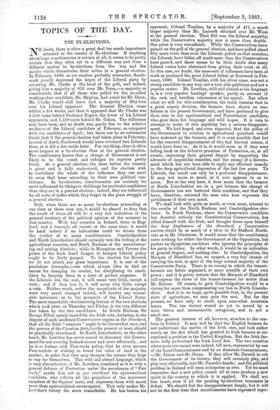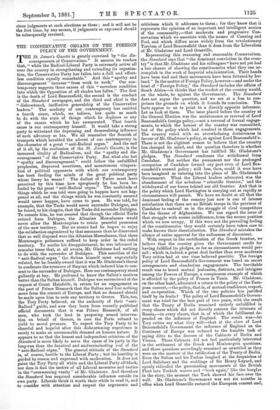TOPICS OF TIIE DAY.
THE BY-ELECTIONS.
NO doubt, there is often a great deal too much importance attached to the results of By-elections. If anything about large constituencies is certain at all, it seems to be pretty certain that they often act in a different way and from a different motive in by-elections from the way and the motive which characterise their action in a general election. In February, 1880, as our readers probably remember, South- wark greatly depressed the hopes of the Liberal party by returning Mr. Clarke at the head of the poll, and indeed, giving him a majority of 853 over Mr. Dunn,—a majority so considerable, that if all those who polled for the so-called working-class candidate, Mr. Shipton, had voted for Mr. Dunn, Mr. Clarke would still have had a majority of fifty-two over his Liberal opponent. The General Election came within a few weeks, and then it appeared that Mr. Clarke was 1,358 votes behind Professor Rogers, the lower of his Liberal opponents, and 1,530 votes behind Mr. Cohen. The difference may have been, and no doubt was, partly due to the relative weakness of the Liberal candidate of February, as compared with the candidates of April ; but there can be no substantial doubt that if the general election had taken place in February, instead of April, Southwark would have returned two Liberals then, as it did a few weeks later. For one thing, there is often more languor at a by-election than at the general election. The constituency knows that a change of Government is not likely to be the result, and indulges its caprices pretty freely. At a general election, the issue before the country is great and is fully understood, and the electors wish to contribute the whole of the influence they can exert to sway that issue according to their own political con-
victions. In by-elections, constituencies are certainly far more influenced by likings or dislikings for particular candidates than they are in a general election ; indeed, they are influenced by all sorts of trifles which they forget in the great struggle of a general election.
Still, when there are so many by-elections proceeding at one time as there now are, it would be absurd to deny that the result of them all will be a very fair indication of the general tendency of the political opinion of the moment in this country. With two counties in Ireland, three in Eng- land, and a borough, all vacant at the same time, it would be hard indeed if no indications could be drawn from the verdict of so many constituencies. Cambridgeshire and North Lincolnshire should certainly test the feeling of the agricultural counties, and North Durham of the manufactur- ing and mining districts ; while in Monaghan and Tyrone the power of the Irish Land League to hamper Liberal policy ought to be fairly gauged. To the election for Berwick we do not attach any great importance. It is one of the pendulous boroughs,—one which always likes to find an excuse for changing its verdict, for disciplining its candi- dates by keeping them in a state of perfect suspense. If the Liberals win the seat, it will mean very little, except a vote ; and if they lose it, it will mean very little, except a vote. Neither result, unless the magnitude of the majority were very much changed indeed, will involve any reason- able inferences as to the prospects of the Liberal Party. The most remarkable electioneering feature of the two elections which took place on Thursday and Friday, is the very different line taken by the two candidates. In North Durham, Sir George Elliot openly touted for the Irish vote, declaring, to the disgust of such moderate Conservative organs as the Standard, that all the Irish " suspects " ought to be liberated at once, and the powers of the Coercion Acts, for the present at least, should be practically abandoned. In North Lincolnshire, on the other hand, Mr. Lowther has never ceased to denounce the Govern- ment for not coercing Ireland sooner and more effectually, and he is so furious with Free-trade policy, that he even accuses Free-traders of wishing to lower the value of land in the market, in order that they may cheapen the estates they hope to buy for themselves. This wild and absurd language, which is very characteristic of Mr. Lowther, combined as it is with a general defence of Protection under the pseudonym of "Fair trade," marks him out as par excellence the squirearchical candidate, who reflects all the prejudices of the narrowest members of the Squires' caste, and expresses them with much more than squirearchical extravagance. This only makes Mr. Lowther's victory the more remarkable. He has beaten his
opponent, Colonel Tomline, by a majority of 471, a much larger majority than Mr. Laycock obtained over Mr. Winn at the general election. Then 205 was the Liberal majority, while the Conservative majority now is more than double. One point is very remarkable. While the Conservatives have gained on the poll of the general election, and have polled about fifty more votes than even the Liberals polled on that occasion, the Liberals have fallen off much more than the Conservatives have gained, and there seems to be little doubt that many Liberal voters have abstained from giving their votes at all. In this case, no doubt, the same sort of influences have been at work as produced the great Liberal defeat at Soatwark in Feb- ruary, 1880. Colonel Tomline, with his silver craze, was not a strong candidate in any way, not a very able politician and not a popular orator. Mr. Lowther, wild and absurd as his language is, is a very popular hustings' speaker, partly on account of the rash and heedless vehemence of his speech. But allow what we will for this consideration, the truth remains that in a great county division, the farmers have shown no con- fidence in the present Government, and have preferred to give their vote to the squirearchical and Protectionist candidate, who gave them hot language and wild hopes. It is vain to. attempt to make of this anything but a serious disappoint- ment. We had hoped, and even expected, that the policy of the Government in relation to agricultural questions would have wakened up the farmers, and it is even possible that but for the renewed disappointment of this bad harvest season, it. would have done so. As it is, it would seem as if they were falling back on the delusive promises of Protection, or, at all events, expressing their general despair by supporting the advocate of impossible remedies, and the enemy of a Govern- ment which has not been able to apply any effectual remedy to the deep agricultural depression of the last few years. To. Liberals, the result can only be a profound disappointment.. It may not mean so much as it now appears to us to mean. But at the very least, it does mean that the farmers of North Lincolnshire are in a pet because the change of Governments has not bettered their condition, and that they have, therefore, returned the man who best expresses the pettishness of their own mood. We shall look with quite as much, or even more, interest to the results of the North Durham and Cambridgeshire elec- tions. In North Durham, where the Conservative candidate has deserted entirely the Constitutional Conservatives, has allied himself with the Irish, and brought down upon himself the deep displeasure of the Standard, a Conservative success would be as much of a blow to Sir Stafford North- cote as to Mr. Gladstone. It would mean that the constituency cares nothing for either the Government or the Opposition, but prefers an Opopsition candidate who ignores the principles of his party to either. In other words, it would be an indication of general disgust, and nothing else. In Cambridgeshire, the Marquis of Blandford has, we suspect, a very fair chance of carrying the seat, in spite of the large normal majority of the Conservatite Party. There is no county in which the tenant- farmers are better organised, or more sensible of their own power ; and it is pretty certain that the Marquis of Blandford will express the views of the tenant-farmers far better than Mr. Bulwer. Of course, to gain Cambridgeshire would be a victory far more than compensating our loss in North Lincoln- shire. And it is, we hope, quite possible that, in the present state of agriculture, we may gain the seat. But for the present, we have only to count upon somewhat uncertain hopes. The one victory scored as yet is scored by a most bitter and unreasonable antagonist, and is not a small one.
The greatest interest of all, however, attaches to the con- tests in Ireland. It may well be that the English farmers do. not understand the merits of the Irish case, and look rather sourly on the Act which has granted to Irish farmers so ex- ceptional a position in the United Kingdom. But the Irish far- mers fully understand the Irish Land Act. The two counties where seats are vacant were indeed, till now, represented by one of the Land Commissioners and by an Assistant-Commissioner, —Mr. Litton and Mr. Given. If they allow Mr. Parnell to rob the Government of its victory, they will certainly play, and play very effectually, into Mr. Parnell's hands ; and the political problem in Ireland will seem as hopeless as ever. Yet we must. remember that a new policy cannot all at once produce a new spirit in the country to which it is applied. We shall not lose heart, even if all the pending by-elections terminate in defeat. We should feel the disappointment deeply, but it will not be the first time that constituencies have expressed capri...
dons judgments at such elections as these ; and it will not be the first time, by any means, if judgments so expressed should be subsequently reversed.



































 Previous page
Previous page